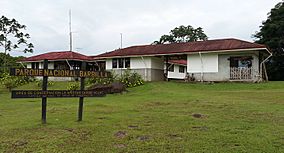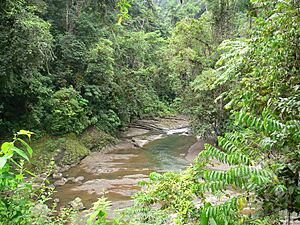Barbilla National Park facts for kids
Quick facts for kids Barbilla National Park |
|
|---|---|
|
IUCN Category II (National Park)
|
|

The ranger station at Barbilla National Park.
|
|
| Location | Costa Rica |
| Nearest city | Siquirres |
| Area | 119 km² |
| Established | 1982 |
| Governing body | National System of Conservation Areas (SINAC) |
| Lua error in Module:Location_map at line 420: attempt to index field 'wikibase' (a nil value). | |
Barbilla National Park is a beautiful National Park in Costa Rica. It's found on the eastern slopes of the Talamanca mountains. This park protects important forests, the Dantas River, and special places like Laguna Ayil and Cerro Tigre. It covers parts of both Cartago and Limón Provinces. The park was first created in 1982.
Contents
Discovering Barbilla National Park
Barbilla National Park protects a huge area of humid lowland tropical forest. It covers over 29,500 acres (about 11,938 hectares). This park is one of Costa Rica's least visited. This means it has stayed very wild and full of different plants and animals.
Amazing Wildlife
Many rare and even endangered animals live here. You might find amazing creatures like jaguars, ocelots, pumas, and tapirs. The park also protects the Dantas River watershed. This river is a very important source of water for both people and animals in the area.
Home to Indigenous People
Barbilla National Park is also home to the Cabécar people. They are the second largest group of indigenous people in Costa Rica. The park is located right next to the Chirripó Indigenous Reserve. This shows how important the park is for both nature and culture.
Visiting the Park
The park has a special Barbilla Biological Station. There is also an administrative building in Brisas de Pacuarito. These buildings are actually just outside the main park area.
Getting There
To reach the park, you travel on an unpaved road. It is about 17 kilometers long and takes about an hour to drive. The start of this road is a few kilometers east of Siquirres.
Exploring the Trails
The path into the park goes through local farms. It then leads down to the Dantas River. The main trail crosses this river. It then climbs up the hill on the other side. There are also a few smaller trails to explore.
See also
 In Spanish: Parque nacional Barbilla para niños
In Spanish: Parque nacional Barbilla para niños
 | James B. Knighten |
 | Azellia White |
 | Willa Brown |


